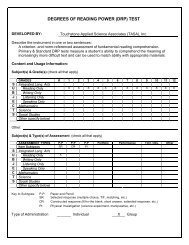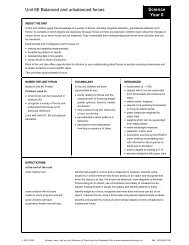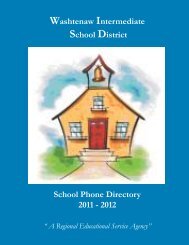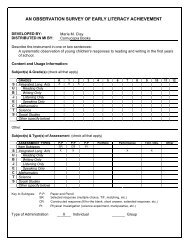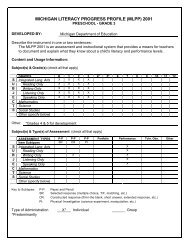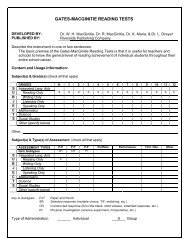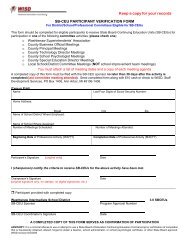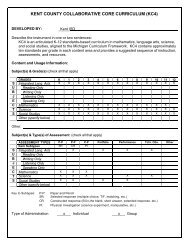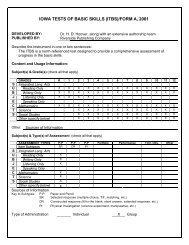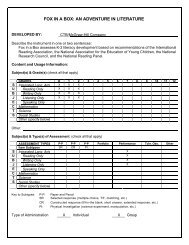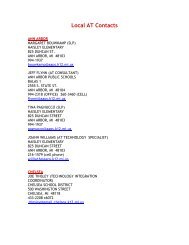Parent Advisory Committee - Washtenaw Intermediate School District
Parent Advisory Committee - Washtenaw Intermediate School District
Parent Advisory Committee - Washtenaw Intermediate School District
Create successful ePaper yourself
Turn your PDF publications into a flip-book with our unique Google optimized e-Paper software.
IDEIA and Michigan LawThe “Individuals with Disabilities Education Improvement Act,” or IDEIA, is one of the laws affecting a student’s participation inspecial education. IDEIA is the Federal Law (Public Law 105-17) that sets national standards for educating students withdisabilities. IDEIA is administered under the United States Department of Education through regulations. IDEIA isreauthorized every 5 years by the United States Congress, and was last reauthorized in 2004. IDEIA continues to work to“improve educational results for children with disabilities” from birth to age 21.IDEIA requires public school agencies to provide Free Appropriate Public Education (FAPE) for students with disabilities inthe Least Restrictive Environment (LRE). IDEIA addresses appropriate evaluations, eligibility for special education, and astudent’s Individual Education Program (IEP) as well as many other special education related areas. It strengthens therole of families in their student’s education and ensures such student’s access to and involvement in the generalcurriculum to the maximum extent possible. Services, aids and supports are provided in the regular classroom, wheneverappropriate. (Note: This parent handbook was written to help families understand the special education process and theIEP.)Michigan has its own law for educating students with disabilities. This is Public Act 451, which is Michigan’s MandatorySpecial Education Act. This is part of a larger Michigan law called the Michigan <strong>School</strong> Code of 1976 and is administeredthrough Michigan Administrative Rules for Special Education. Michigan’s law provides educational services to studentswith disabilities to age 26 (Note that this is a higher standard than is required by IDEIA [age 21] and Michigan publicschool agencies must meet the higher standard). <strong>School</strong>s in Michigan must provide an education designed to develop themaximum potential of every student eligible with a disability. Michigan schools must also comply with the federal lawssuch as IDEIA.Copies of these laws, regulations, and rules are available at libraries, intermediate or local public school agencies, throughstate or federal offices of special education, through state or federal legislators, or on the Internet. Remember that bothfederal and state laws undergo periodic review and reauthorization. Please see the Resources for <strong>Parent</strong>s, Appendix F, inthis handbook for addresses, phone numbers, and Michigan Office of Special Education/Early Intervention Serviceswebsite. See the inside back cover for the names of local public school agency special education administrators and PACmembers.No Child Left BehindThe No Child Left Behind (NCLB) Act is a federal law enacted in 2001 that calls for standards-based reform of theeducational system. Key provisions include testing requirements at multiple levels of student performance and theestablishment of baseline school pass rates. The act focuses on each school making Adequate Yearly Progress (AYP)toward the goal of 100% students maintaining a passing grade in reading and mathematics by 2014. This law includesaccountability standards, supplemental services required in underperforming schools, and the eventual restructuring ofschools that fail to make AYP for a specified number of years.For students with the most significant cognitive disabilities, only 1% of the students within a districts may be given analternative assessment and still be included in AYP calculations. Now, however, an additional 2% of students may betested on “modified academic achievement standards” without a school incurring an AYP penalty.NCLB requires all elementary, middle and secondary teachers to be highly qualified. Special education teachers who teachcore academic subjects must meet highly qualified requirements. Teacher consultants, resource room teachers who donot teach core academics and special education teachers team-teaching in a general education classroom do not have tomeet the highly qualified requirement. Special education teachers who teach to alternate achievement standards onlyneed to meet the highly qualified elementary requirements, even if they teach at the secondary level.All paraprofessionals must now meet highly qualified requirements as well. Paraprofessionals must have a secondaryschool diploma or its recognized equivalent. All paraprofessionals hired after January 8, 2002, and working with a20




